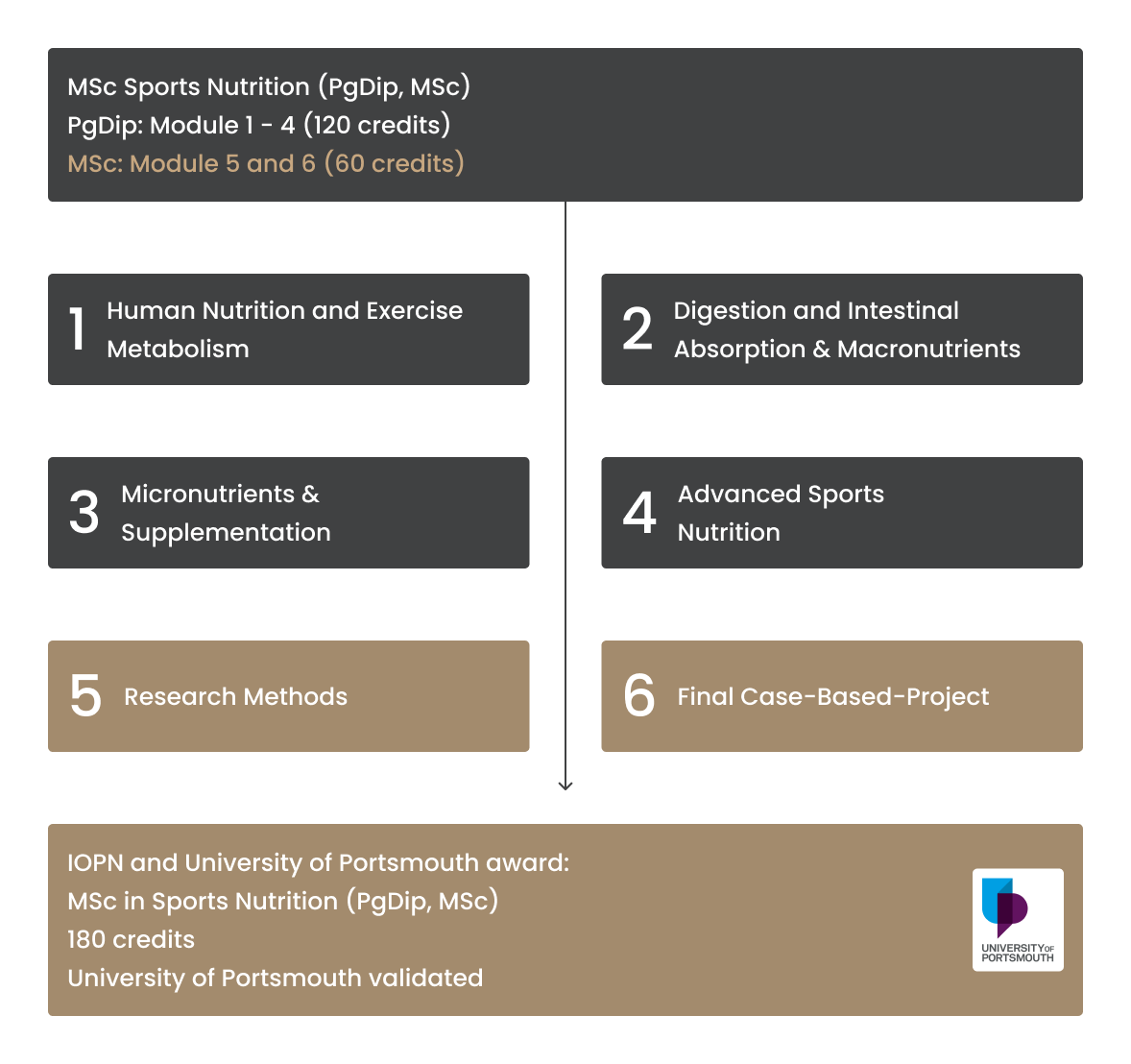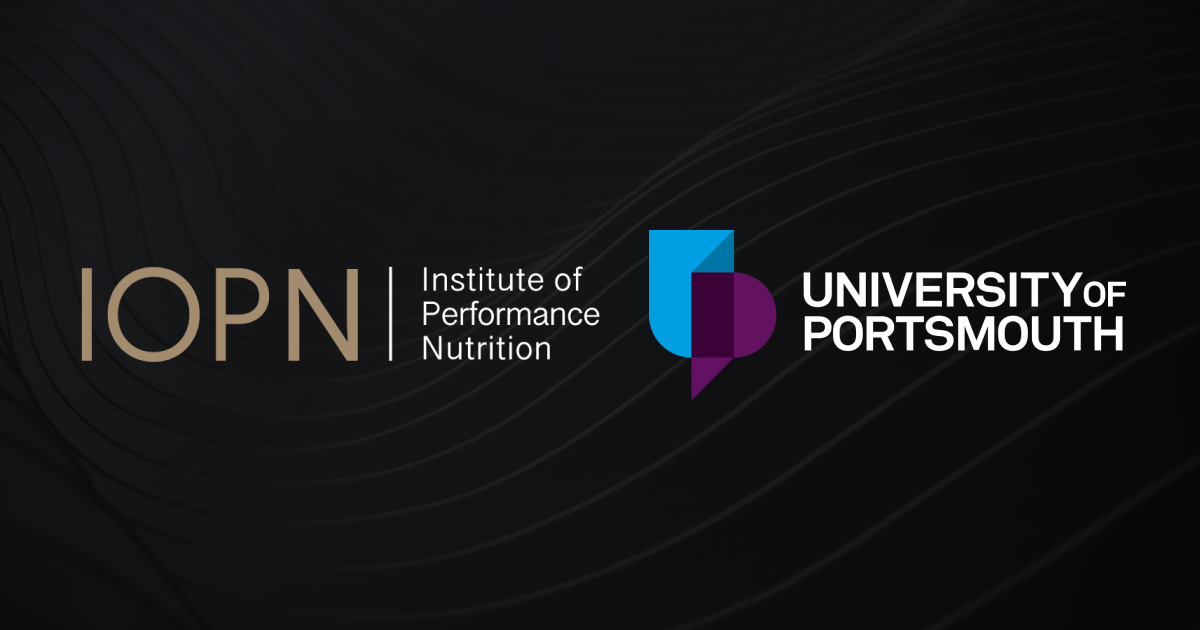About this course
Designed with flexibility and applied practice at its core, the part-time IOPN MSc degree is the new gold standard for the next generation of sport and exercise nutritionists.
Validated by the University of Portsmouth, you will earn a globally respected Master of Science (MSc) degree from the industry leading Institute of Performance Nutrition.
You’ll have the flexibility to study part-time, enabling you to balance personal and professional commitments.
You’ll immerse yourself in a rich, applied learning environment, supported by a team of PhD-level practitioners and researchers and guided by the IOPN’s Founder Dr Laurent Bannock. Plus, you’ll be part of an impressive network, drawing on the expertise of over 40 guest experts, more than any undergraduate and postgraduate programme globally, to ensure your success during and after the programme.
Why choose the IOPN MSc in Sports Nutrition?
- Achieve a globally recognised Master of Science (MSc) degree.
- Complete your studies entirely online around work and other important commitments.
- Experience over 45 case-based scenarios to develop transferrable skills that you can apply in practice.
- Access to academic support and research supervision throughout your journey.
- Join a global network of evidence-based practitioners and thought leaders in sport and exercise nutrition.
- Undertake an independent research project to deepen your specialism and enhance your career impact.
Key points
Modules you'll cover
- Module 1: Human Nutrition and Exercise Metabolism (PGDip)
- Module 2: Macronutrient Digestion, Absorption and Metabolism (PGDip)
- Module 3: Hydration, Micronutrients and Supplements (PGDip)
- Module 4: Advanced Sport and Exercise Nutrition (PGDip)
- Module 5: Research Methods for Evidence-Based Practitioners (MSc)
- Module 6: Case Study Final Project (MSc)
Entry requirements
- Direct entry: Subject to a successful CV and cover letter, applicants who demonstrate evidence of an undergraduate degree or other relevant level 6 awards (or international equivalent) in a discipline specific to sport or nutrition (i.e., sports science, strength & conditioning, human nutrition, public health nutrition, sports nutrition, dietetics etc.) or a life science (i.e., biology, physiology) are eligible. Students with degrees in psychology and education are also eligible.
- Portfolio entry: Applicants with professional and/or accredited certifications (i.e., personal training, nutrition coaching), plus a minimum of 1 year of relevant experience (i.e., as a personal trainer, strength & conditioning coach, or nutritionist) are also eligible, with applications reviewed on a case by case basis.
- English language: All applicants must satisfy an IELTS 6.5 level (CEFR: C1) of English comprehension. Alternatively, if applicants can demonstrate that they have completed an undergraduate or postgraduate degree in English in the last five years, then this will also be accepted as having met the standard without demonstrating IELTS certification.
Modules explained
The PGDip in Sports Nutrition offers a rich, applied learning experience designed to prepare you for real-world practice. You’ll complete four modules that build your ability to critically evaluate research, apply evidence-informed strategies, and support athlete performance across a range of contexts. You will achieve a PGDip exit award following the completion of Module 4, with the option to continue your learning journey through the IOPN MSc in Sports Nutrition (top-up).
Module 1: Human Nutrition and Exercise Metabolism
30 credits
This module introduces students to key critical concepts in exercise biochemistry and integrated metabolism, physiology, and human nutrition and their application within a sport and exercise nutrition context. Students will critically evaluate the roles and requirements of nutrition in relation to performance and athlete health. Moreover, the module examines the domains of exercise metabolism, skeletal muscle plasticity and function, fatigue and the components of a healthy, sustainable diet through the lens of an athlete. Through real-world case studies involving recreational and professional athletes, students will develop and justify evidence-based nutrition strategies that align with athletes’ metabolic demands, performance goals and diverse dietary preferences.
Module 2: Macronutrient Digestion, Absorption and Metabolism
30 credits
This module critically explores the structure and function of the gastrointestinal system and the digestion and absorption of macronutrients at rest and during exercise. It examines the biochemical and metabolic pathways of carbohydrate, fat, and protein and how these are regulated by exercise and nutrition. Students will critically evaluate the impact of macronutrient availability on fuelling, recovery and training adaptation and develop evidence-based nutrition strategies that align with athletes’ training demands, performance goals, and individual preferences. Through applied case study assignments, students will translate theory into practical nutrition strategies to support athlete health and performance.
Module 3: Hydration, Micronutrients and Supplements
30 credits
This module provides students with an applied and critical understanding of thermoregulation, fluid balance, and hydration for athletes across various sports and environmental conditions. It explores the physiological function and performance relevance of micronutrients, the assessment of micronutrient status, and strategies to prevent deficiency in athletes. The module critically evaluates the role, efficacy, and regulation of dietary supplements and ergogenic aids, including their ethical implications and practical application in sport. Through case study assignments, students will evaluate hydration and micronutrient needs, interpret biomarker and sweat rate data, appraise supplement research, and design evidence-informed nutrition strategies that support athlete health, performance, and safe supplement use.
Module 4: Advanced Sport and Exercise Nutrition
30 credits
This module critically explores advanced and contemporary topics in sport and exercise nutrition, including the role of nutrition in supporting training adaptation, immune function, managing body composition, and addressing the diverse needs of athletes. Students will examine the scientific and practical considerations for developing safe, effective, and individualised nutrition strategies, incorporating behaviour change techniques to critically enhance adherence and long-term impact. Through case study assignments, learners will translate knowledge into practice by designing evidence-based strategies tailored to athletes across a range of sports, life stages, and performance scenarios.
Module 5: Research methods for evidence-based practitioners
30 credits
This module allows students to formulate critical and focused research questions, conduct systematic searches of scientific literature, and critically appraise evidence for its methodological quality, statistical reliability and validity, and practical relevance. Students will gain hands-on experience in data interpretation, statistical analysis, and evidence synthesis, with a focus on applying these skills to inform their nutrition strategies and monitor the outcomes of their interventions. By the end of the module, students will have produced a short-form research review using critical appraisal frameworks, a long-form literature review, and a research proposal that will underpin their applied case study project in Module 6.
Module 6: Case study final project
30 credits
This module provides students with the opportunity to design, implement, and perform a longitudinal analysis of a real-world case subject. Drawing on critical theoretical knowledge and professionally orientated practical skills developed across the previous modules, students will apply evidence-based strategies to support the performance of an athlete. The project requires students to justify their case study plan using current research, interpret outcome data, and reflect on their decision-making process, challenges encountered, and areas for professional development. This module emphasises the integration of research, applied practice, and reflective learning to provide students with the competence and confidence to work critically as an evidence-based practitioner in the field of sport and exercise.




